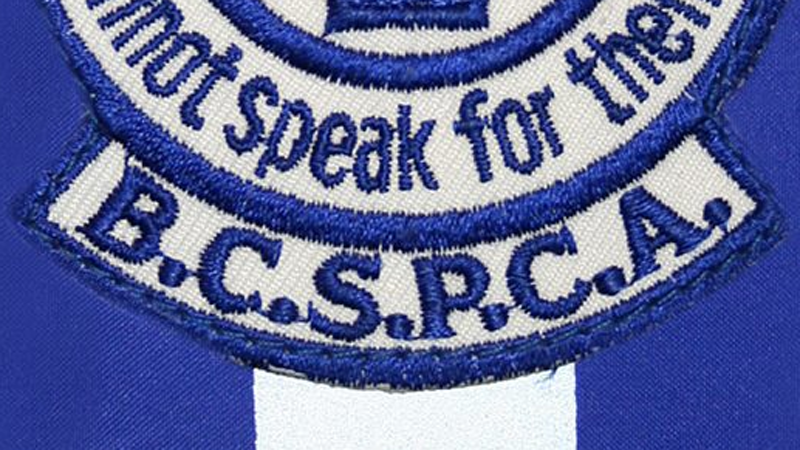Dog who tested positive for opioids won't be returned to owner, B.C. tribunal rules

A dog who tested positive for opioids, cocaine and amphetamines after being seized from a social housing property in Vancouver will not be returned to her owner, a B.C. tribunal has ruled.
An SPCA officer entered the property last December and seized Bailey the dog over concerns she was repeatedly being exposed to hard drugs in her owner's unit.
But the owner, who had raised Bailey since she was a puppy, fought to have the dog returned through the Farm Industry Review Board, an independent tribunal that hears a variety of complaints and appeals, some involving SPCA animal seizures.
A board panel ultimately determined that reuniting Bailey with her owner would not be in the dog's best interests.
"The panel finds that if returned, Bailey would be placed in a perpetual state of exposure and would inevitably return to a circumstance of distress which would require a further seizure," presiding member Wendy Holm wrote in a Feb. 27 decision.
Bailey's seizure on Dec. 14 followed three complaints over six months from building staff and a neighbour, who reported that the animal had exhibited troubling symptoms ranging from whimpering and shaking to lethargy and an inability to stand upright.
Staff told an SPCA officer they believed Bailey was exposed to drugs "on almost a daily basis," according to the decision. The board also heard employees had administered the opioid antidote naloxone to Bailey on more than one occasion due to concerns she might be overdosing.
After Bailey was seized, a veterinarian tested her and confirmed there were several illicit substances in her system, but that she was "clinically OK and did not require further treatment or medical intervention." The dog was placed with a foster family the same day.
The owner, identified only as J.K. in the decision, acknowledged he uses drugs at home, but denied that Bailey would have been exposed to them in his unit. Instead, J.K. suggested the exposures must have happened when he was in the care of staff, who took Bailey on walks due to his mobility issues.
The panel was not convinced, however, hearing testimony from a neighbour, whose identity was withheld, that other pets in the building never seemed to suffer the same symptoms.
"The witness testified that in instances where Bailey had been in the care of others for extended periods of time, her health and overall presentation had improved dramatically," Holm wrote.
"When Bailey was returned to the (owner's) care, she returned to demonstrating the effects of drug exposure."
The board also heard J.K. had refused offers from staff to care for Bailey while he was using drugs, and on the weekends, and that he declined offers to bring her in for veterinary care.
On top of keeping Bailey in the SPCA's custody, the board ordered J.K. to pay the animal welfare organization costs totalling $331, the bulk of which stemmed from the dog's veterinary care.
CTVNews.ca Top Stories

Prime Minister Trudeau meets Donald Trump at Mar-a-Lago
Prime Minister Justin Trudeau landed in West Palm Beach, Fla., on Friday evening to meet with U.S.-president elect Donald Trump at Mar-a-Lago, sources confirm to CTV News.
'Mayday! Mayday! Mayday!': Details emerge in Boeing 737 incident at Montreal airport
New details suggest that there were communication issues between the pilots of a charter flight and the control tower at Montreal's Mirabel airport when a Boeing 737 made an emergency landing on Wednesday.
Hit man offered $100,000 to kill Montreal crime reporter covering his trial
Political leaders and press freedom groups on Friday were left shell-shocked after Montreal news outlet La Presse revealed that a hit man had offered $100,000 to have one of its crime reporters assassinated.
Questrade lays off undisclosed number of employees
Questrade Financial Group Inc. says it has laid off an undisclosed number of employees to better fit its business strategy.
Cucumbers sold in Ontario, other provinces recalled over possible salmonella contamination
A U.S. company is recalling cucumbers sold in Ontario and other Canadian provinces due to possible salmonella contamination.
Billboard apologizes to Taylor Swift for video snafu
Billboard put together a video of some of Swift's achievements and used a clip from Kanye West's music video for the song 'Famous.'
Musk joins Trump and family for Thanksgiving at Mar-a-Lago
Elon Musk had a seat at the family table for Thanksgiving dinner at Mar-a-Lago, joining President-elect Donald Trump, Melania Trump and their 18-year-old son.
John Herdman resigns as head coach of Toronto FC
John Herdman, embroiled in the drone-spying scandal that has dogged Canada Soccer, has resigned as coach of Toronto FC.
Weekend weather: Parts of Canada could see up to 50 centimetres of snow, wind chills of -40
Winter is less than a month away, but parts of Canada are already projected to see winter-like weather.

































